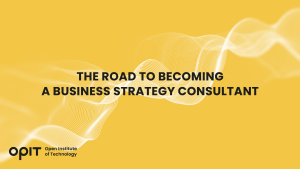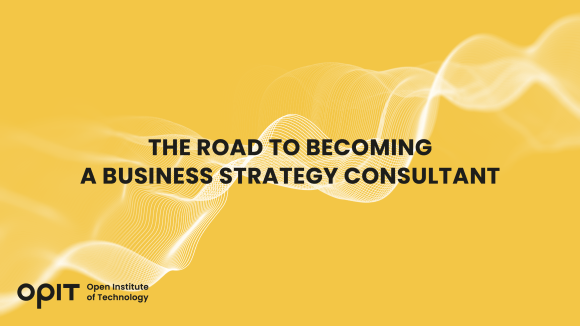

Business strategy consulting is a growing field. Digital transformation is one trend driving the need for consultants who can provide advice and support on areas existing business leaders aren’t familiar with. Emerging technologies like AI and machine learning also offer opportunities for strategy consultants. If you feel like you’ve got your finger on the pulse of modern business trends, it could be a very profitable career choice.
OPIT’s BSc in Digital Business provides an educational pathway to achieving success as a business strategy consultant. If you already have a bachelor’s degree, a master’s could be your next step to gaining thorough proficiency in this field.
Understanding Business Strategy Consulting
Successful companies tend to be very good at what they do, whether that’s providing a physical product or a service. The most successful firms know that for some things, they need external help. Business strategy consultants are usually third-party, outsourced professionals who spend time with the company on a temporary basis. They’re onboarded to deal with specific challenges, from employee churn to reduced profits.
Consultants use their business acumen and digital skills to assess problems and suggest solutions. They may also help implement those solutions, set goals and KPIs, and monitor results. The success of a consultant’s strategy could determine the future of their career. With that in mind, these professionals are highly driven to help the companies they work for succeed.
Specific responsibilities may involve:
- Assessing current budgets and financial processes
- Liaising with executives from CEOs to CFOs
- Driving efficiencies across various departments
- Identifying growth opportunities
What skills does a business strategy consultant need to perform these duties? Ideally, they’ll have a strong grasp of the company’s industry. They also need to demonstrate digital fluency, particularly in data analysis and visualization. Business consultants must also be objective, great listeners, and effective communicators.
Educational Pathways to Business Strategy Consulting
Business strategy consultants need a bachelor’s degree at the very minimum. OPIT’s BSc in Digital Business covers many of the skills needed for success in this role. You’ll learn business management skills alongside computer science. There are sections on managerial economics, project management, and digital analytics — all critical knowledge for a business consultancy role.
Graduates can opt for a master’s degree to hone their skill set. The MSc in Applied Digital Business delves deep into business strategy and its interplay with digitalization. There’s also the opportunity for an internship to gain real-life experience.
Building Your Career as a Business Strategy Consultant
Your degree is a great foundation for your career as a business strategy consultant. However, it’s important to build up from here any way you can. Here’s one step-by-step pathway you could follow to achieve success as a business consultant.
- Take an Internship
As mentioned before, some courses come with the opportunity for internships. Consider seeking time working with existing consulting firms. You might want to think about the industry you’re most interested in and opt for organizations within that sphere. Another option is to approach companies within that market and offer your services to get as much experience as possible.
- Create a Network of Contacts
While you’re finding ways to gain this experience, start building a network of contacts. A business leader who is impressed with your internship now might hire you in the future. Make sure you keep a record of their details. You can also attend conferences, webinars, and industry trade shows. Speak to people, tell them what you do and what your goals are. It’s a great way to meet people with similar interests and make contacts that can help your career.
- Embrace Life-Long Learning
Continuous education is also vital. The digital landscape is always shifting, so business strategy consultants have to keep up with trends in transformation and data management. Seeking out courses that you can complete alongside your existing career is one way to ensure you’re always ahead of the curve.
Key Skills for Success in Business Strategy Consulting
All business strategy consultants need the following skills:
- Knowing how to make tough calls.
- Handling conflict and objections.
- The ability to make snap decisions.
- Utilizing multiple streams of data to make those decisions.
- The determination to see projects through to completion.
- The confidence to take risks and pivot when something isn’t working.
Your OPIT courses support you in the development of these skills. Because you study foundational business skills alongside data science, you learn how to connect analysis to business decisions. You can quickly justify what others might see as brash choices by visualizing the data that led to that path.
OPIT’s Role in Shaping Future Business Strategy Consultants
At OPIT, our courses are helping create a highly skilled cohort of business strategy consultants. The career-aligned courses are designed to meet the demands of the consultancy industry and the digital needs of the companies you’ll work with.
The BSc in Digital Business is a fully remote, online course. The program runs over five terms, with a final additional term for completing your dissertation project. The minimum timeframe is 24 months, but 36 months is the standard length.
You’ll start with business fundamentals, moving on to computer architectures, ICT skills, and web development. More importantly, for prospective consultants, you cover digital business models, business strategy, and critical thinking.
The MSc in Applied Digital Business builds on what you already know. You’ll cover data science and AI and how it fits into the digital economy. From here, you’ll discover business problem-solving, digital project management, and entrepreneurship, among other topics.
After your third term, you’ll start your thesis project, where you’re encouraged to intern with a trusted industrial partner. You can complete this course in 12 months on the fast-track plan, and the regular duration is 18 months.
As well as the high-quality course content and opportunities to work with professionals, you gain access to unparalleled student support. It’s important that students don’t feel alone or isolated during remote learning. With the proper support, online or hybrid study can be more effective than traditional classroom or lecture-based learning. Analysis from the UK shows that 85% of studies on online learning confirm that supportive, digital courses are more beneficial to students than conventional courses.
Combine Digital Fluency With Business Expertise for a Lucrative Career
Your role as a business strategy consultant could change the direction of many companies. The satisfaction you’ll gain from driving success and transformation is second to none. Successful consultants never stop learning, always discovering new ways to uncover business opportunities.
If you’re excited to start your journey towards business strategy consulting, explore OPIT’s available courses or contact us for more details.
Related posts

Life is unpredictable. While many of us have specific hopes and expectations of how our futures will turn out, things don’t always go as expected. There are many variables and unexpected incidents that can interfere and force you to alter your plans, and this is particularly true when it comes to education.
For instance, you might have had plans to study a specific subject, but had to deviate from those plans due to unforeseen circumstances. Or you may have had to enter the workforce in an occupation different from the one you sought in an effort to earn an income, a move that may not provide you with the time or opportunity to achieve your desired educational aims.
In short, every individual’s career pathway is different, and very few go exactly as we expect from the outset. Fortunately, even if you experience a few false starts or sudden twists in your pathway, there are always options available to help you get back on track.
The Unpredictable Nature of Education
In theory, the educational process seems simple. You select a course of study that interests you from the vast array of subjects and prospective professions, select the appropriate classes, acquire the knowledge and skills you need to succeed, and then embark on your profession.
In reality, however, as many people know from firsthand experience, the road to education is often far from straightforward. Here are just some of the many challenges that can take your educational path in a completely different direction:
- Life’s Curveballs: As touched on in the introduction, life is impossible to predict. Financial hardships, health issues, and family emergencies are just some of the unfortunate occurrences that might derail even the most perfectly planned educational regime.
- Changing Interests: People’s desires and preferences don’t necessarily stay the same throughout their entire lives. As you grow, learn, and have new experiences, your interests may change, and so, too, may your educational objectives.
- Pressure and Burnout: Some academic paths are particularly challenging, demanding intense levels of study and hard work. This can sometimes prove too much to bear, even for the most resilient students.
- Failures and Setbacks: Conventional education largely builds around tests and examinations, requiring students to demonstrate their competencies repeatedly. It’s a system that doesn’t suit everyone, and test failures can lead to setbacks and delays.
- Inequality: People can be born with very different privileges and levels of access to education. Those in certain parts of the world may find it much more challenging to complete their education path for financial, cultural, or even political reasons.
- Late Bloomers: People develop at different paces. Some may struggle educationally early on in their lives, forcing them to make certain concessions or sacrifices related to their studies, only to find their feet later in life once they’ve entered the world of work.
Whether you’re a late bloomer, have had your educational aspirations delayed by personal problems, desire to learn new skills and try something different, or want to begin a fresh chapter in your professional life, the Open Institute of Technology (OPIT) may be able to help.
Introducing OPIT
OPIT is an online teaching platform, making high-level technological educational programs accessible to all, no matter their age or background. Offering education in fields like computer science, artificial intelligence, and digital business, OPIT provides a curated collection of degrees. In addition, they offer classes taught by world-leading tutors imparting the wisdom and skills students need to achieve their goals and become the tech leaders of tomorrow.
Meanwhile, for those who have had somewhat tumultuous or unpredictable educational paths, OPIT offers the perfect course corrector: the OPIT Foundation Year.
The OPIT Foundation Year
OPIT’s Foundation Year is a Pre-Tertiary Certificate in Information Technology, fully aligned with MQF/EQF Level 4 standards and valued at 60 ECTS credits. Lasting just one year, this program essentially serves as a comprehensive yet accessible springboard towards higher-level education, creating a path towards degrees and careers in dynamic, flexible fields, like computer science and digital business.
Like other OPIT programs, the Foundation Year is delivered entirely online via the OPIT Virtual Learning Environment. Combining live lectures, asynchronous content, and interactive assessments, students enjoy diverse and dynamic study experiences, acquiring core skills like academic writing, mathematics, and computer literacy, and building a bedrock of knowledge and confidence before taking their next steps.
Who Is the Foundation Program For?
The Foundation Program is designed to provide a solid base upon which to build the technological education many students need. It’s the perfect choice for those who are eager and ambitious to enter professions in AI, data science, and computing, but don’t feel that they have the necessary core skills and knowledge needed to dive straight into a degree.
Entry requirements are relatively relaxed in order to allow as many students as possible to enjoy the benefits of this program. With that said, applicants should ideally hold an MQF/EQF Level 3 or equivalent qualification, with the intention of pursuing a bachelor’s degree. A minimum of B2 level of English proficiency is also required, as this is the working and studying language of the institution.
What the Foundation Year Provides
Perhaps you’ve recently graduated, are considering a career change, or finally have the opportunity to return to education after initial delays or unexpected disruptions to your original plans. Either way, the Foundation Year can help you enjoy:
- Greater Self-Confidence: Foundation Year graduates gain the fundamental skills they need to enter degree programs with much more self-belief and assuredness.
- Superior Tech Knowledge: Lasting two terms, this course explores mathematics, academic reading and writing, and provides an introduction to computer hardware and software.
- Foundational Mathematics: Mathematics literacy forms a large part of the study focus for the Foundation Year, helping students feel more comfortable with numbers and formulas.
- Flexible Learning: Unlike more rigid, conventional education environments, OPIT gives you the freedom and flexibility to study at a pace that suits you best, all from the comfort of home.
- Global Community: OPIT is an international institution, with staff and students from all around the world eager to share knowledge, exchange ideas, and help one another.
Take Your Next Steps to Success With the OPIT Foundation Year
If you’re curious about a career in technology or have always wanted to work with AI, data, and computers, but struggled to find the time and opportunities you need to acquire relevant skills and knowledge, the Foundation Program was made for people like you.
It’s the ideal entry point into the exciting world of online education, and the perfect first step towards a prestigious degree from an innovative and increasingly successful institution. Download the brochure to learn more about it, or start your online application, today.

Students today have a broader range of fields of study to choose from than ever before, but with the world becoming increasingly technological and computers increasing in influence and importance, pursuing a career in computer science often proves a smart, strategic choice.
There are numerous benefits and career paths associated with studying and working in computer science, and we’ll be listing just a few of them in this guide.
High Average Salaries
With the rising cost of living in many parts of the world, it’s unsurprising that many students are thinking several decades ahead to determine what level of starting salaries they could obtain in different career fields.
Many are also seeking professions that offer the opportunity for growth and the ability to advance up the ranks over time, thus increasing their salary and their quality of life in the process.
If a strong, stable salary with the opportunity for improved income is one of your top career priorities, computer science should be at or near the top of your list of prospective careers.
According to recent data, computer scientists earn an average of over €65,000 per year, with certain jobs, like IT project leader and data scientist, paying ever higher. Starting salaries are strong, too, with graduates earning anywhere from €46,000 to €60,000, depending on their chosen profession and level of qualifications.
There are similarly high average salaries reported around the world in computer science and related fields such as data science and AI/ML engineering. These numbers are projected to increase in the years to come, pointing to computer science as a way for graduates to get off to the best financial start of any career.
Unrivaled Flexibility
A common problem with some subjects and courses is that they only provide graduates with a narrow set of skills and a similarly narrow range of potential professions to which they can apply those skills.
That’s not the case with computer science. Graduates in this field can enjoy instant access to a remarkably diverse array of career opportunities, with even newer opportunities being created all the time as technology evolves and innovations emerge.
A few of the many industries and roles you might choose to enter in the field of computer science include:
- Healthcare: As a software developer, data analyst, or cybersecurity expert
- Finance: As a fintech engineer, blockchain developer, or security analyst
- Media: As a graphics programmer, AI developer, or game developer
- Education: As an analyst, software developer, or machine learning engineer
Guaranteed Opportunities
Some career paths are more limited than others, with relatively low numbers of opportunities, recurring risks of job loss, or difficulty obtaining employment in the first place.
Again, with computer science, this simply isn’t the case. At a time when 75% of companies plan to embrace AI and other technologies by 2027, and businesses of all sizes and industries are now relying on computers more than ever before, computer science graduates can enjoy almost unbeatable job security.
Opportunities will continue to grow for people with good computing knowledge, whether that be in the obvious fields like software and web development, engineering, and AI development, or more niche sectors.
With so many options, you’re effectively guaranteed a long, rewarding career if you put in the necessary time and effort needed to establish a strong foundation of computing skills.
Rapidly Expanding and Evolving Industries
It’s no secret that the world of technology is a dynamic and fast-moving one. In the past 20 years alone, we’ve seen the proliferation of the internet, the rapid advancement of smartphones and wearable devices, the emergence of AI, and so much more.
In the years ahead, engineers and developers will continue to explore the boundaries of modern technology’s powers and potential, driving new innovations and improvements and opening more exciting job opportunities for those already established and experienced in this field.
Getting into computer science now could therefore provide a solid foundation for a career filled with excitement as you uncover and explore new ways of working with computers in fields as diverse as healthcare, finance, education, entertainment, manufacturing, logistics, and beyond.
Start Your Computer Science Career at OPIT
We’ve discussed some of the many benefits associated with careers in computer science, from the high starting salaries to the rapidly growing array of job options available to graduates. By now, you may be eager to follow this particular career path and take advantage of the wealth of opportunities.
If you’re wondering how to start, the Open Institute of Technology (OPIT) may hold the answers you need. As an exclusively online learning platform, specializing in computer science and digital business, and staffed by some of the world’s leading tech experts, OPIT is producing the tech leaders of tomorrow.
Some of the many advantages of learning with OPIT include:
- Accessible and flexible online education that matches your learning style and schedule
- Heavy focus on real-world applications of the skills you acquire
- An international community of like-minded students from around the globe
- A top team of tutors and lecturers from varying fields and industries
- Progressive assessment of skills and understanding – not constant exams
OPIT offers a small, curated selection of courses for those seeking to gain the technological skills and knowledge to succeed in their chosen areas of expertise. That includes a BSc (Hons) in Computer Science – a six-term program, worth 180 ECTS credits.
Numerous IT industry leaders and experts helped develop this fully accredited undergraduate degree, which is online and accessible to all. Like other OPIT courses, it offers a flexible learning program, with progressive assessments, fast-track options, and the opportunity to be part of a growing community of learners and tutors.
If the benefits of doing a career in computer science interest you, download the OPIT BSc in Computer Science brochure or fill out an online application today and take your first step toward a rewarding and fulfilling profession.
Have questions?
Visit our FAQ page or get in touch with us!
Write us at +39 335 576 0263
Get in touch at hello@opit.com
Talk to one of our Study Advisors
We are international
We can speak in:


